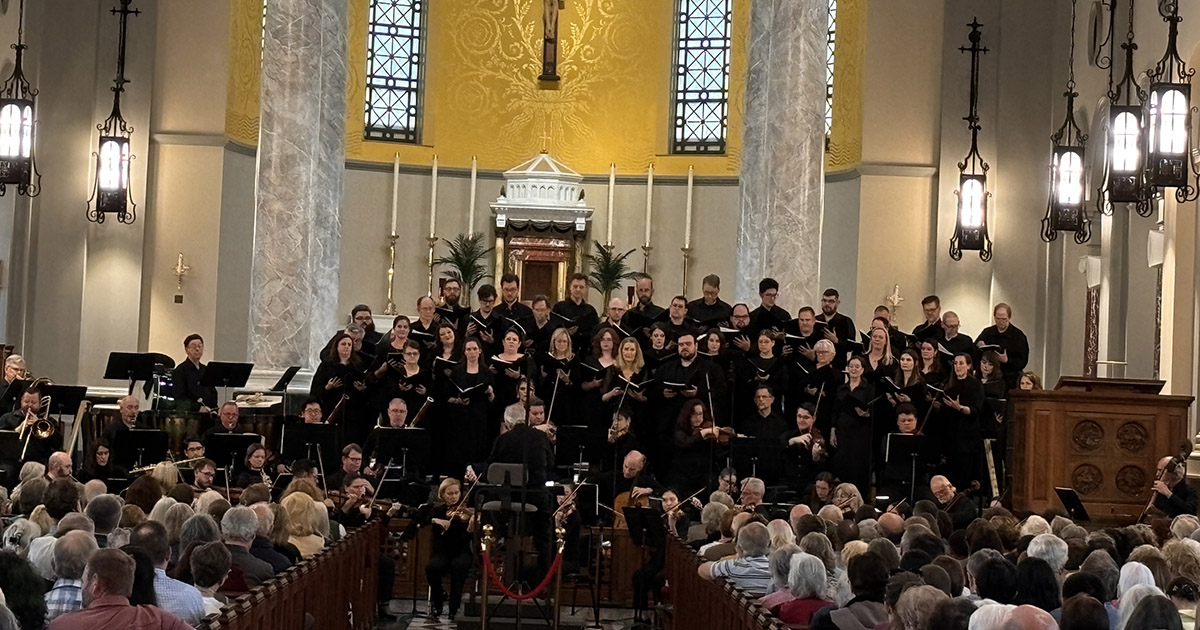For those who may have missed the re-naming after last season, the Knoxville music organization known as ACE is now the Amadeus Concert Ensemble, a reflection of larger and grander intentions in filling its particular niche in the music scene. That niche is one in which it tackles vocal, operatic, and choral subject matter with notable soloists and a full orchestra and chorus under the physical umbrella of the Cathedral Concert Series at Knoxville’s Sacred Heart Cathedral. After a performance history that has embraced composers like J.S. Bach, Giuseppe Verdi, Rossini, Mozart. and curated selections of French and Spanish musical gems, ACE turned its attention last Sunday afternoon to sacred music of the Czech composer, Antonin Dvořák. Chosen were four movements from the Stabat Mater (1877) and the complete four movement cantata Te Deum (1892).
In addition to a 46-member orchestra and a 43-member chorus, this very memorable afternoon concert featured four soloists: soprano Maria Natale, alto Diana Salesky, tenor John Overholt, and bass Stephen Morscheck. The conductor was Howard Skinner, the patriarch of the ACE-founding Skinner family. With some sadness, it was announced that Maestro Skinner, at age 94, would be conducting his final concert.

It goes without saying that a significant benefit of the ACE concerts—perhaps even its raison d’etre, is the programming of works that are generally under-performed, certainly so outside of larger cities than Knoxville. Both of the Dvořák works fall into this category and were welcome for both their historical and their musical contexts.
While contemporary listeners may be removed both literally and figuratively from the context of the Stabat Mater, its sorrow and drama finds its way to to the audience’ ears. In 1877, the composer was faced with the tragedy of three of his children dying. Composed just months after the deaths, the work is a statement of Dvořák’s deep Roman Catholic faith.
In this performance, one felt the weight of grief even without partaking of the translation. Skinner’s direction never seemed to falter, his tempos were gently relentless and the layers of exposed instrumental moments properly guided. The quartet of soloists were solid in the opening Stabat Mater dolorosa and the final movement Quando corpus morietur. Bass Morscheck brought gravity and a rich tone to “Fac ut ardeat cor meum.” Alto Diana Salesky’s “Inflammatus” was marvelously communicated with crisp diction and a beautiful richness in the lower tones. Soprano Natale and tenor John Overholt gave their solo moments the appropriate character. The chorus handled the fugue and finale with a serious precision of delivery.
Changing both in time and character, Dvořák’s Te Deum came some 15 years after the Stabat Mater as the composer was preparing for his residency in America. The work, overflowing with operatic and symphonic influences, was delicious and welcome contrast between a religious text and the very real world of nature. The final movement was a joy with Natale and Morscheck exploring soaring heights and the solid Earth as the work ends joyously with a rapturous ‘Alleluja.’
The next ACE contribution to the Cathedral Concert Series comes on February 16, 2025, with “The Lighter Side of Beethoven”, a selection of rarely heard Beethoven works, including material from the composer’s cantatas and unfinished operas.








